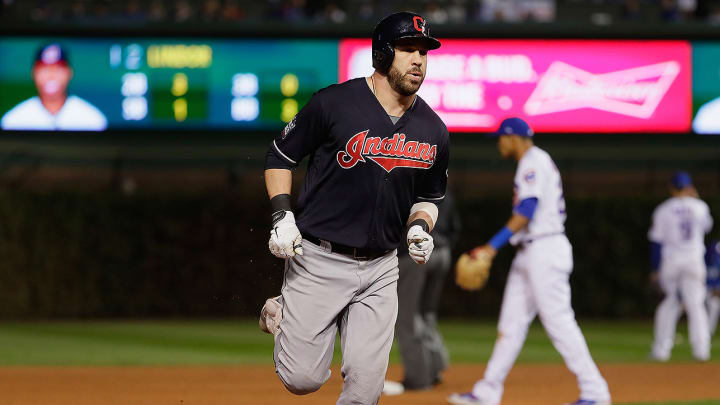Jason Kipnis stars for Indians in Game 4 against the team he grew up loving

CHICAGO—When Indians second baseman Jason Kipnis checked his phone in the moments after Game 4 of the World Series, in which his three-run home run helped Cleveland take a 3–1 series lead, he had well over 100 texts waiting for him. How many of them were celebratory and how many hateful?
“Most—actually, all of them were congratulatory,” he says, widening the a like a good Chicago boy, before admitting that he’s a little surprised by his loved ones’ well-wishes.
He doesn’t blame them for being conflicted. Born and raised 20 miles north of Wrigley Field, in Northbrook, Ill., the 29-year-old Kipnis felt a twinge himself when he watched his hometown team win Game 6 of the NLCS to advance to the Fall Classic. He grew up obsessed with Sammy Sosa; he lived down the street from Steve Bartman; an uncle delivered one of Ryne Sandberg’s kids. A close friend owns a bar down the block from the park whose voicemail ends with “Go Cubs!” Kipnis attended the Cubs’ Game 3 victory in the 2003 NLDS, cheering for the home team.
“The 10-year-old boy in me is saying, Why does it have to be the Cubs?” he told reporters before Game 1. But he is all in, joking about tormenting his cousins at Thanksgiving and promising his heart now belongs to Cleveland. “There’s not one part of me that doesn’t wish this curse would keep going,” he said firmly before the Series began.
So for the boy who spent his childhood imagining hitting a ball into the Wrigley Field stands in the World Series, that the home run came in the top of the inning rather than the bottom did not diminish its magic.
“It was special,” he said softly, then immediately got back to business. “It meant a lot to me and it meant a lot to this team. It gave us some cushion.”
• Three Strikes: Kluber, Kipnis deliver in Game 4 to put Indians on brink of title
They didn’t need much. In the first comeback victory—if you can even call it that; Cleveland retook the lead in the second inning-by any team since the Division Series, a team that had averaged 3½ runs per game in the postseason to this point exploded for a breezy, three-hour-and-16-minute 7–2 win.
For a little while there, it looked like ace Corey Kluber, who has now pitched nearly a third of his team’s innings this postseason, would have to do everything himself. Working on short rest for the second time in his life, he allowed the first Chicago run in a World Series game at Wrigley Field since 1945. A few minutes later, with two on and two out and the game tied at one, he arrived at the plate wielding injured leftfielder Michael Brantley’s bat. After taking three balls and a strike, and then fighting off three two-seamers inside, Kluber managed to chop one 30 feet down the third base line to give himself a 2–1 lead.
The Cleveland dugout erupted in shouts and laughter and a little trash-talking about how it would look for the position players to get outhit by their pitcher; Kluber, who his teammates steadfastly maintain has a personality, remained stone-faced as he took first.
Joe Buck: Why calling World Series at Wrigley Field will be my career highlight
The ballpark, which had seemed to sway under the weight of all the excitement of that first run—not to mention the cosmic bulk of the ghosts of the generations born after 1908—leaked energy slowly as it became clear that this would not be the night. The Indians padded their lead in the third and sixth innings; the Cubs advanced two men as far as second base.
“It’s good when you can take the crowd out of it,” Kipnis said, fully aware that some of that crowd were there to see him—and that he did most of the damage. (He requested eight tickets for each game of the Series; the rest of his friends are on their own. “They’d probably be wearing Cubs shirts anyway,” he said before Game 1.)
The second of his three hits on the night was that line drive into the rightfield bleachers, the one that fulfilled a dream, brought the score to 7–1 and spurred one of the more ridiculous dugout celebrations in baseball, the wedding-chair-lift dance and chanting that follows every Kipnis home run. (“I don’t even know what they’re saying,” leftfielder Rajai Davis admitted after the game. “I just yell.”)
With backs against wall in World Series, Cubs won’t change habitual approach
The Series is not over yet—manager Terry Francona knows better than most that a 3–1 lead does not guarantee victory; his Red Sox twice surmounted that deficit—but the Indians now have three chances to close it out. And a team that has insisted all postseason that it is focused only on the task at hand is starting to imagine how a championship might feel. And if they could do it at Wrigley, one childhood Cubs fan might just get to experience another dream come true.
“I try not to [imagine ending it here]”, says Kipnis, “but the thought’s creeping into my mind. We’re close. It’s probably gonna be the toughest win of the year.”
